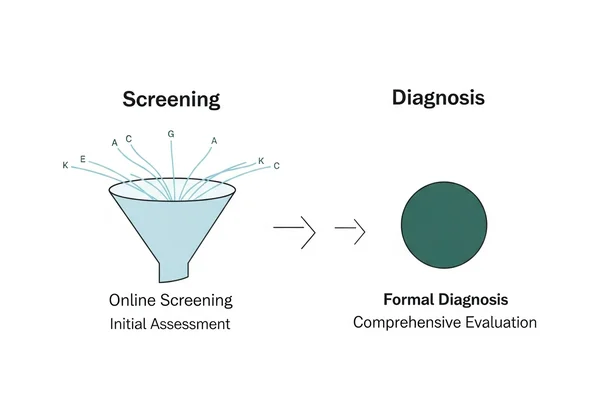ผลการทดสอบออนไลน์เกี่ยวกับภาวะออทิสติกสเปกตรัม: แนวทางและแหล่งสนับสนุน
July 13, 2025 | By Leo Whitaker
การได้รับ ผลการทดสอบภาวะออทิสติก ทางออนไลน์อาจก่อให้เกิดคำถามมากมาย โดยเฉพาะอย่างยิ่งหากผลบ่งชี้ถึงความจำเป็นในการสำรวจเพิ่มเติม สงสัยว่า ควรทำอย่างไรหลังจากการทดสอบคัดกรองภาวะออทิสติกเบื้องต้นเป็นบวก? คู่มือนี้จัดทำขึ้นเพื่อช่วยให้คุณเข้าใจผลลัพธ์และจัดการกับขั้นตอนต่อไปของคุณ ไม่ว่าจะเป็นสำหรับตัวคุณเอง ลูกของคุณ หรือคนที่คุณรัก โปรดจำไว้ว่าการทดสอบออนไลน์เป็นเพียงเครื่องมือคัดกรอง ไม่ใช่การวินิจฉัย แต่ก็เป็นก้าวแรกที่สำคัญในการเดินทางสู่ความเข้าใจและการสนับสนุน เป้าหมายของเราในฐานะ แหล่งข้อมูลที่เชื่อถือได้ คือการเสริมสร้างพลังให้คุณด้วยข้อมูลเชิงลึกและแนะนำคุณไปยังแหล่งข้อมูลที่เหมาะสม
ทำความเข้าใจผลการทดสอบภาวะออทิสติกทางออนไลน์ของคุณ
การได้รับ ผลการทดสอบภาวะออทิสติกทางออนไลน์ อาจทำให้เกิดอารมณ์หลากหลาย การทำความเข้าใจว่าผลลัพธ์เหล่านี้มีความหมายอย่างไรอย่างแท้จริงเป็นสิ่งสำคัญยิ่งขณะที่คุณกำลังดำเนินชีวิตต่อไป แพลตฟอร์มของเรานำเสนอ การทดสอบภาวะออทิสติกสเปกตรัม ออนไลน์ที่ปลอดภัย เป็นความลับ ที่อิงหลักการทางวิทยาศาสตร์ และฟรี ซึ่งออกแบบมาเพื่อให้ข้อมูลเชิงลึกเบื้องต้น

การคัดกรองเทียบกับการวินิจฉัย: ชี้แจงความแตกต่าง
เพื่อให้การตัดสินใจมีข้อมูลครบถ้วน เป็นสิ่งสำคัญยิ่งที่จะต้องแยกแยะระหว่าง การคัดกรอง เบื้องต้นและ การวินิจฉัยอย่างเป็นทางการ การ ทดสอบภาวะออทิสติกสเปกตรัม ออนไลน์ เช่นที่เรานำเสนอ นำเสนอการคัดกรองเบื้องต้น ซึ่งหมายความว่าเป็นการระบุลักษณะที่เป็นไปได้ซึ่งสอดคล้องกับโรคออทิสติกสเปกตรัม (ASD) ซึ่งบ่งชี้ว่าการตรวจสอบเพิ่มเติมอาจเป็นประโยชน์ นี่ไม่ใช่ การวินิจฉัยอย่างเป็นทางการ การวินิจฉัยสามารถทำได้โดยผู้เชี่ยวชาญทางการแพทย์ที่มีคุณสมบัติผ่านการประเมินที่ครอบคลุมเท่านั้น การทดสอบของเราอิงตามการวิจัยและเครื่องมือคัดกรองที่ตรวจสอบแล้ว ซึ่งให้จุดเริ่มต้นที่เชื่อถือได้สำหรับการสำรวจของคุณ หากต้องการเริ่มต้นการเดินทางของคุณ คุณสามารถ เริ่มการทดสอบฟรี

การตีความคะแนนและตัวบ่งชี้ที่สำคัญของคุณ
เมื่อตีความคะแนนและตัวบ่งชี้ที่สำคัญของคุณ โปรดพิจารณาผลลัพธ์ของคุณในบริบทที่กว้างขึ้นของพฤติกรรมที่สังเกตได้ การทดสอบออนไลน์ของเราออกแบบมาเพื่อเน้นรูปแบบที่เกี่ยวข้องกับลักษณะหลักของ ASD เช่น ความแตกต่างในการสื่อสารทางสังคม พฤติกรรมซ้ำ ๆ และการประมวลผลทางประสาทสัมผัส คะแนนที่สูงขึ้นหรือตัวบ่งชี้เฉพาะอาจบ่งชี้ถึงความเป็นไปได้ของลักษณะออทิสติกที่มากขึ้น อย่างไรก็ตาม ไม่มีคะแนนใดคะแนนหนึ่งที่บอกเล่าเรื่องราวทั้งหมดได้ โปรดให้ความสนใจกับวิธีที่ตัวบ่งชี้เหล่านี้สะท้อนกับประสบการณ์ส่วนตัวของคุณหรือพฤติกรรมของบุตรหลานของคุณ รายงานที่ประมวลผลโดย AI เชิงลึกของเราสามารถให้ข้อมูลเชิงลึกที่มากกว่าการคัดกรองพื้นฐาน โดยระบุจุดแข็ง ความท้าทาย และคำแนะนำที่นำไปปฏิบัติได้
การจดจำรูปแบบ: เมื่อใดควรสำรวจเพิ่มเติม
การจดจำรูปแบบในชีวิตประจำวันที่สอดคล้องกับผลการทดสอบของคุณเป็นกุญแจสำคัญในการตัดสินใจว่าจะสำรวจเพิ่มเติมเมื่อใด หากตัวบ่งชี้จากเครื่องมือคัดกรองออนไลน์ของคุณ ควบคู่ไปกับการสังเกตการณ์ที่ยาวนาน บ่งชี้ถึงความท้าทายที่สม่ำเสมอในด้านต่าง ๆ เช่น ปฏิสัมพันธ์ทางสังคม การสื่อสาร หรือการควบคุมประสาทสัมผัส อาจถึงเวลาที่ต้องพิจารณาการประเมินจากผู้เชี่ยวชาญ สำหรับผู้ใหญ่ นี่อาจแสดงออกเป็นความยากลำบากอย่างต่อเนื่องในการทำความเข้าใจสัญญาณทางสังคม หรือการจัดการกับข้อมูลทางประสาทสัมผัส สำหรับเด็ก อาจเป็นการล่าช้าในการพัฒนาการพูด หรือรูปแบบการเล่นที่ผิดปกติ แพลตฟอร์มของเราช่วยคุณระบุรูปแบบเบื้องต้นที่เกี่ยวข้องกับ สัญญาณของภาวะออทิสติก
ควรทำอย่างไรหลังจากการทดสอบคัดกรองภาวะออทิสติกเบื้องต้นเป็นบวก
ผลการคัดกรอง การทดสอบภาวะออทิสติกสเปกตรัม ที่เป็นบวกอาจเป็นช่วงเวลาสำคัญ แม้ว่าจะไม่ใช่การวินิจฉัย แต่ก็เป็นสัญญาณที่ชัดเจนในการดำเนินการประเมินและการสนับสนุนเพิ่มเติม ส่วนนี้จะสรุปขั้นตอนต่อไปที่จำเป็น
การแสวงหาการวินิจฉัยภาวะออทิสติกอย่างเป็นทางการ
ขั้นตอนที่สำคัญที่สุดหลังจากผลคัดกรองเป็นบวก คือการแสวงหา การวินิจฉัยภาวะออทิสติกอย่างเป็นทางการ กระบวนการนี้โดยทั่วไปเกี่ยวข้องกับทีมผู้เชี่ยวชาญ ซึ่งรวมถึงกุมารแพทย์พัฒนาการ นักจิตวิทยา หรือจิตแพทย์ ที่ทำการประเมินเชิงลึก การประเมินเหล่านี้ครอบคลุมประวัติพัฒนาการโดยละเอียด การประเมินเชิงสังเกตการณ์ และเครื่องมือการวินิจฉัยที่เป็นมาตรฐานบ่อยครั้งเพื่อยืนยันการมีอยู่ของ ASD การวินิจฉัยตั้งแต่เนิ่นๆ โดยเฉพาะอย่างยิ่งสำหรับเด็ก สามารถเปิดประตูสู่การบำบัดที่ทันท่วงทีและบริการสนับสนุนที่ปรับปรุงผลลัพธ์ได้อย่างมาก สำหรับผู้ใหญ่ สามารถให้ความกระจ่าง การยืนยัน และเส้นทางสู่การสนับสนุนที่เหมาะสม คุณสามารถเรียนรู้เพิ่มเติมเกี่ยวกับกระบวนการวินิจฉัยได้โดยไปที่ แหล่งข้อมูลของเรา
การค้นหาผู้เชี่ยวชาญที่มีคุณสมบัติ: ควรปรึกษาใคร
ในการค้นหาผู้เชี่ยวชาญที่มีคุณสมบัติ โปรดมองหาผู้เชี่ยวชาญที่เชี่ยวชาญด้านการประเมินภาวะออทิสติก สำหรับเด็ก กุมารแพทย์พัฒนาการ นักจิตวิทยาเด็ก หรือจิตแพทย์เด็ก มักจะเป็นจุดแรกที่ต้องติดต่อ สำหรับผู้ใหญ่ นักจิตวิทยาคลินิก จิตแพทย์ หรือนักประสาทวิทยาที่มีความเชี่ยวชาญในความผิดปกติของระบบประสาทพัฒนาการ สามารถให้ การประเมินภาวะออทิสติกสำหรับผู้ใหญ่ทางออนไลน์ หรือด้วยตนเองได้ ขอแนะนำให้ปรึกษาผู้เชี่ยวชาญที่มีประสบการณ์กับกลุ่มอายุที่เฉพาะเจาะจง และคุ้นเคยกับเกณฑ์การวินิจฉัยปัจจุบัน (DSM-5) แพทย์ประจำตัวของคุณมักจะสามารถแนะนำผู้เชี่ยวชาญในพื้นที่ได้ พิจารณาการสำรวจเว็บไซต์ของเราเพื่อค้นหาข้อมูลเพิ่มเติมเกี่ยวกับการ เชื่อมต่อกับการสนับสนุน

การเตรียมตัวสำหรับการประเมินวินิจฉัย
การเตรียมตัวสำหรับการประเมินวินิจฉัยสามารถช่วยให้แน่ใจว่าการประเมินครอบคลุมครบถ้วน โปรดรวบรวมเอกสารที่เกี่ยวข้อง เช่น บันทึกพัฒนาการ รายงานจากโรงเรียน การประเมินทางจิตวิทยาครั้งก่อน หรือประวัติโดยละเอียดของพฤติกรรมและความท้าทายที่สังเกตได้ เตรียมพร้อมที่จะพูดคุยเกี่ยวกับประวัติครอบครัว ประวัติทางการแพทย์ และข้อกังวลเฉพาะ สำหรับเด็ก คุณอาจถูกขอให้กรอกแบบสอบถาม เช่น M-CHAT-R/F ในขณะที่สำหรับผู้ใหญ่ อาจมีการใช้เครื่องมือต่างๆ เช่น การทดสอบ RAADSR หรือ AQ การจัดระเบียบและการเปิดใจกับทีมประเมินจะช่วยให้พวกเขาได้รับภาพที่สมบูรณ์ที่สุด
การเชื่อมต่อกับการสนับสนุนและแหล่งข้อมูลเกี่ยวกับภาวะออทิสติก
การใช้ชีวิตกับภาวะออทิสติก ไม่ว่าจะเป็นส่วนตัวหรือในฐานะสมาชิกในครอบครัว เป็นการเดินทางที่ได้รับประโยชน์อย่างมากจากการเชื่อมต่อกับ การสนับสนุนและแหล่งข้อมูลเกี่ยวกับภาวะออทิสติก เครือข่ายเหล่านี้ให้คำแนะนำ ความเข้าใจ และกลยุทธ์ที่นำไปปฏิบัติได้จริงอย่างประเมินค่ามิได้
การสนับสนุนสำหรับผู้ใหญ่และวัยรุ่นออทิสติก
สำหรับ ผู้ใหญ่และวัยรุ่นออทิสติก การเชื่อมต่อกับการสนับสนุนหมายถึงการค้นหาชุมชนและแหล่งข้อมูลที่เข้าใจประสบการณ์เฉพาะของความหลากหลายทางระบบประสาท ซึ่งอาจรวมถึงกลุ่มสนับสนุนเพื่อน การบำบัดที่มุ่งเน้นแนวทางที่สนับสนุนความหลากหลายทางระบบประสาท หรือแหล่งข้อมูลที่ออกแบบมาเพื่อช่วยเหลือด้านการจ้างงาน การศึกษา หรือการดำรงชีวิตอย่างอิสระ บุคคลออทิสติกจำนวนมากพบความแข็งแกร่งและการเป็นส่วนหนึ่งในฟอรัมออนไลน์และกลุ่มในท้องถิ่นที่พวกเขาสามารถแบ่งปันประสบการณ์และกลยุทธ์ได้ แพลตฟอร์มของเรานำเสนอการทดสอบเฉพาะตามอายุ เช่น การทดสอบภาวะออทิสติกสเปกตรัมสำหรับผู้ใหญ่ และ การทดสอบภาวะออทิสติกสเปกตรัมสำหรับวัยรุ่น เพื่อช่วยให้บุคคลได้รับข้อมูลเชิงลึกเบื้องต้น
แหล่งข้อมูลสำหรับผู้ปกครองของเด็กออทิสติก
ผู้ปกครองมักแสวงหา แหล่งข้อมูลสำหรับผู้ปกครองที่มีบุตรหลานออทิสติก ที่ครอบคลุม ซึ่งรวมถึงคำแนะนำเกี่ยวกับโปรแกรมการแทรกแซงตั้งแต่เนิ่นๆ กลยุทธ์การสนับสนุนทางการศึกษา การบำบัดพฤติกรรม (เช่น ABA หรือการสนับสนุนพฤติกรรมเชิงบวก) และการค้นหาเครือข่ายสนับสนุนผู้ปกครองในท้องถิ่น องค์กรที่อุทิศตนให้กับการสนับสนุน ภาวะออทิสติก มักจะให้ข้อมูลเชิงลึก เวิร์กช็อป และกิจกรรมสำหรับครอบครัวมากมาย การทำความเข้าใจความต้องการเฉพาะของบุตรหลานของคุณและการสนับสนุนการสนับสนุนที่เหมาะสมในโรงเรียนและชุมชนเป็นสิ่งสำคัญ การทดสอบภาวะออทิสติกสำหรับเด็ก บนเว็บไซต์ของเราสามารถเป็นจุดเริ่มต้นที่มีประโยชน์สำหรับผู้ปกครอง
การสร้างชุมชนที่สนับสนุน
การสร้างชุมชนที่สนับสนุนเป็นสิ่งสำคัญสำหรับทุกคนในการเดินทางเกี่ยวกับภาวะออทิสติก ชุมชนนี้สามารถประกอบด้วยครอบครัว เพื่อนฝูง ผู้เชี่ยวชาญ และบุคคลอื่น ๆ ที่มีประสบการณ์คล้ายคลึงกัน การเข้าร่วมกลุ่มสนับสนุนในท้องถิ่นหรือออนไลน์สามารถให้ความรู้สึกเป็นส่วนหนึ่ง ลดความโดดเดี่ยว และให้คำแนะนำที่นำไปปฏิบัติได้จริงจากผู้ที่เคยผ่านความท้าทายที่คล้ายคลึงกันมาแล้ว โปรดจำไว้ว่า คุณไม่ต้องเผชิญกับการเดินทางนี้เพียงลำพัง การเชื่อมต่อกับผู้อื่นที่เข้าใจสามารถเสริมสร้างพลังให้คุณและคนที่คุณรักเพื่อให้ประสบความสำเร็จ

เส้นทางข้างหน้าของคุณ: การดำเนินการและการเสริมพลัง
การทำความเข้าใจ ผลการทดสอบภาวะออทิสติก ของคุณเป็นก้าวสำคัญบนเส้นทางของการค้นพบตัวเองหรือการให้คำแนะนำแก่ผู้ปกครอง การเดินทางนี้เกี่ยวกับการเสริมพลังผ่านความรู้และการดำเนินการ ไม่ว่าคุณจะแสวงหาการวินิจฉัย สำรวจระบบสนับสนุน หรือเพียงแค่พยายามทำความเข้าใจตัวเองหรือคนที่คุณรักให้ดีขึ้น ทุกก้าวไปข้างหน้าล้วนมีส่วนช่วยให้ชีวิตมีความสมบูรณ์และเติมเต็มยิ่งขึ้น
ขณะที่คุณก้าวไปข้างหน้า โปรดทราบว่าแพลตฟอร์มของเราพร้อมให้การสนับสนุนคุณ การคัดกรองภาวะออทิสติกออนไลน์ ที่รวดเร็วและเชื่อถือได้ของเราให้ข้อมูลเชิงลึกทันที และเพื่อความเข้าใจที่ลึกซึ้งและเป็นส่วนตัวยิ่งขึ้น รายงานที่ประมวลผลโดย AI ของเราจะให้ขั้นตอนต่อไปที่ปรับให้เหมาะกับคุณ พร้อมที่จะได้รับความกระจ่างและค้นหาการสนับสนุนแล้วหรือยัง? สำรวจการทดสอบเฉพาะตามอายุและแหล่งข้อมูลที่ครอบคลุมของเราวันนี้ การเดินทางที่เสริมพลังให้คุณสู่ความเข้าใจเริ่มต้นแล้ว

คำถามที่พบบ่อยเกี่ยวกับขั้นตอนต่อไปในการคัดกรองภาวะออทิสติก
ฉันควรทำอย่างไรทันทีหลังจากทำการ ทดสอบภาวะออทิสติกออนไลน์?
ทันทีหลังจากทำการ ทดสอบคัดกรองภาวะออทิสติกออนไลน์ สิ่งสำคัญคือต้องจำไว้ว่านี่คือการคัดกรอง ไม่ใช่การวินิจฉัย ใช้เวลาทบทวนผลลัพธ์ของคุณและดูว่าสอดคล้องกับการสังเกตหรือประสบการณ์ของคุณอย่างไรหรือไม่ หากผลลัพธ์บ่งชี้ถึงการมีอยู่ของลักษณะภาวะออทิสติก ขั้นตอนต่อไปที่แนะนำคือการพิจารณาการประเมินโดยผู้เชี่ยวชาญเพื่อรับการวินิจฉัยอย่างเป็นทางการ
การทดสอบภาวะออทิสติกออนไลน์ แม่นยำสำหรับการวินิจฉัยจริงหรือ?
ไม่ การ ทดสอบภาวะออทิสติกออนไลน์ ไม่แม่นยำสำหรับการวินิจฉัย การทดสอบออนไลน์ รวมถึง การคัดกรองฟรีของเรา เป็นเครื่องมือคัดกรองที่อิงตามการวิจัยที่ตรวจสอบแล้ว (เช่น การทดสอบ AQ) ซึ่งออกแบบมาเพื่อบ่งชี้ถึง ความเป็นไปได้ ของลักษณะภาวะออทิสติก พวกมันทำหน้าที่เป็นก้าวแรกที่เป็นประโยชน์ กระตุ้นให้คุณพิจารณาว่าจำเป็นต้องมีการประเมินอย่างเป็นทางการโดยผู้เชี่ยวชาญทางการแพทย์ที่มีคุณสมบัติหรือไม่ การทดสอบภาวะออทิสติกออนไลน์ ใดๆ ไม่สามารถทดแทนการประเมินทางคลินิกที่ครอบคลุมได้
ฉันจะได้รับการ วินิจฉัยภาวะออทิสติกอย่างเป็นทางการ หลังจากการคัดกรองได้อย่างไร?
ในการรับ การวินิจฉัยภาวะออทิสติกอย่างเป็นทางการ หลังจากการคัดกรอง คุณควรปรึกษาผู้เชี่ยวชาญทางการแพทย์ โดยทั่วไปแล้ว เกี่ยวข้องกับการติดต่อแพทย์ประจำตัวของคุณเพื่อขอส่งต่อไปยังผู้เชี่ยวชาญ เช่น กุมารแพทย์พัฒนาการ นักจิตวิทยาเด็ก หรือจิตแพทย์ผู้ใหญ่ ที่เชี่ยวชาญด้านความผิดปกติของระบบประสาทพัฒนาการ พวกเขาจะทำการประเมินอย่างครอบคลุม เริ่มการเดินทางของคุณด้วยการทดสอบภาวะออทิสติกออนไลน์ เพื่อรับข้อมูลเชิงลึกเบื้องต้น
ผู้ที่มีภาวะออทิสติกเล็กน้อยยังสามารถได้รับประโยชน์จากการสนับสนุนได้หรือไม่?
ใช่ อย่างแน่นอน แม้ว่าคุณจะมี ภาวะออทิสติกเล็กน้อย หรือมีผลการทดสอบที่แสดงถึง สัญญาณภาวะออทิสติก ที่ละเอียดอ่อน คุณก็ยังสามารถได้รับประโยชน์จากการสนับสนุนได้อย่างมาก ภาวะออทิสติกเป็นสเปกตรัม หมายความว่าบุคคลต่างๆ มีประสบการณ์ที่แตกต่างกัน และความต้องการในการสนับสนุนก็แตกต่างกัน การสนับสนุนสามารถช่วยในความท้าทายเฉพาะ เช่น การสื่อสารทางสังคม ความไวต่อประสาทสัมผัส หรือการบริหารจัดการตนเอง ซึ่งช่วยเพิ่มคุณภาพชีวิตและความเป็นอยู่ที่ดี
มีการสนับสนุนประเภทใดบ้างสำหรับบุคคลออทิสติกและครอบครัวของพวกเขา?
มีการสนับสนุนที่หลากหลายสำหรับบุคคลออทิสติกและครอบครัวของพวกเขา ซึ่งรวมถึงการบำบัดพฤติกรรม การแทรกแซงทางการศึกษา กิจกรรมบำบัด อรรถบำบัด การฝึกทักษะทางสังคม กลุ่มสนับสนุน และแหล่งข้อมูลสำหรับการใช้ชีวิตประจำวัน ประเภทของการสนับสนุนจะขึ้นอยู่กับความต้องการและอายุของแต่ละบุคคล สำรวจแหล่งข้อมูล บนเว็บไซต์ของเรา เพื่อค้นหา คำแนะนำการสนับสนุน เพิ่มเติม